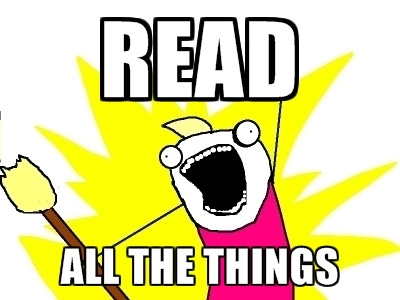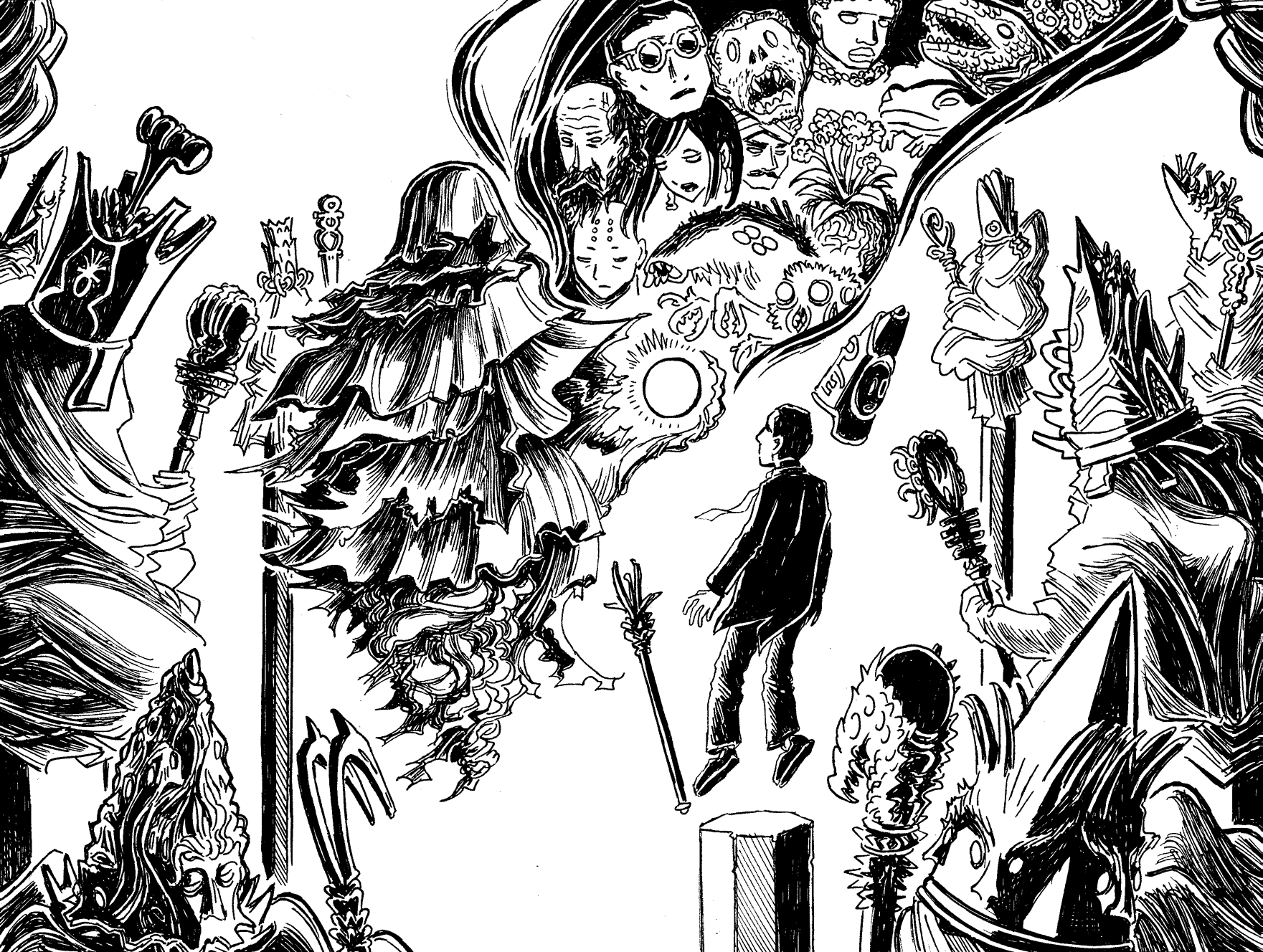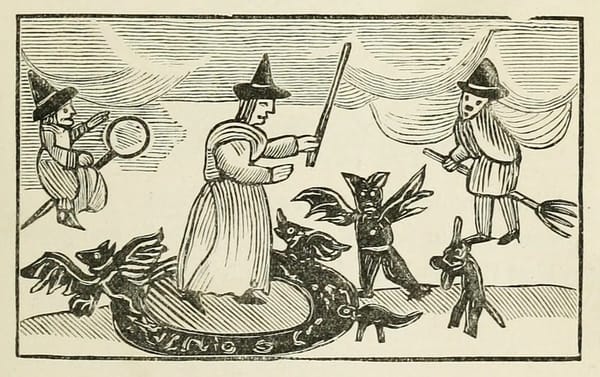Note 18: Into 2021, and Beyond!
A middle-aged man stumbles into the new year.
I hope everyone’s enjoying their last week of 2020 (or doing your best to smother it with a pillow). It’s been a long year, but we were fortunate to get some great Star Wars content in the form of the second season of The Mandalorian, but it seems that some folks aren’t finished reliving their favorite parts of Star Wars, and we have a United States Senator dead set on doing his best Jar Jar Binks impression:
Millions of voters concerned about election integrity deserve to be heard. I will object on January 6 on their behalf
— Josh Hawley (@HawleyMO) 3:40 PM ∙ Dec 30, 2020
In the interest of full disclosure, Senator Hawley married a high school classmate of mine, and while we’re pretty much the same age, I would have assumed that he was more of an Original Trilogy fan than a Prequel enthusiast. That said, if he wants to re-enact the fall of the Old Republic, there are much better scenes to use from Attack of the Clones than this one:
Now, while I may be a bit unfair comparing the Senator to the floppy-eared Gungan, it’s pretty transparent that this stupid stunt is a play for Trump’s base that will end poorly for the Senator if he expects Trump to hand him the reigns of the #MAGANation, as opposed to one of his spawn. (My money is on Don Junior.)
Hawley’s going to learn the hard way that while he thinks he’s the Anakin Skywalker to Trump’s Palpatine, he’s actually Count Dooku with a rapidly approaching expiration date.
You would think that despite his faux populism, Hawley would have at least encountered the work of Joseph Campbell during all those years spent in private schools. He should have absorbed Campbell’s main lesson that there are no new stories, and we keep telling ourselves the same ones over and over in different guises. Pretty much everyone standing outside of the #MAGA bubble can see how this will play out, even those of us who absorbed their Campbell by way of George Lucas.
Now, one of the questions that I get when talking about politics is how worried all of this makes me. On a scale of 1 to 100, (with a 100 being Private Hudson on the surface of LV-426), I’m around a 20 to 25 these days. While I think that there’s cause for concern and all of this stress on our democracy is completely avoidable and unproductive, I still have faith in our institutions that we’ll make it through the other side. Hawley and his Sith-wannabe pals - who forget the first rule of the Sith: there can only ever be two - can object to the election results as much as they like, but unless they can conjure around 8 million Trump votes from the Outer Rim, Biden will be President in a few weeks.
(And for those readers who think I’m being uncharitable, please provide me with whatever evidence you can that the Trumpy objectors cared about election security before Trump lost and started throwing his tantrum. I don’t recall Hawley/Cruz/etc. complaining about a non-functional Federal Election Commission during the election, nor do I see them supporting election-security legislation in the run-up to the presidential race. If there’s a case to be made that these maneuvers are honestly about election security - as opposed to proving one’s #MAGA bonafides - show me the receipts. Comments are open below.)
As someone who remains a registered Republican (primarily on free enterprise and decentralization-of-power Federalist grounds), the Party repeatedly punching itself in the crotch is painful to watch, but the rhythm of jabs is proving useful to distinguishing which members of the Party are those worth rebuilding the team around (folks like Romney and Sasse) from those who are too easily seduced into the autocratic fever swamps by incompetent con-men, whispering sweet nothings into the ears of those eager to listen (or unable to follow through to the end of the Prequel Trilogy).
100 books in 2021
I have this strange habit every odd-numbered year where I commit to reading one hundred books in a single year. I started in 2013 and met the challenge in 2015, 2017, and 2019. I don’t have a good excuse for not doing this in 2021, so we’re off to the races on Friday.
I’ve found that this exercise is a good one for getting over some humps and making my way through books that I might not read otherwise. For example, I’m looking forward to using this year to finally get through Robert Jordan’s The Wheel of Time, clear out my Trump-era political takes and memoirs backlog, work through Rod Dreher’s unique take on modern conservatism, schooling myself on the Dark Mountain Project’s inspirations, and to clear the three foot stack of physical books sitting on my whiskey barrel end table next to my reading chair.

Other than adhering to the ethos above, there’s not much more of an organizing principle than stuffing my brain full of words. If you’d like to follow along this journey, next week you’ll start seeing an additional section added to this newsletter, which will be small reviews of the weeks’ books.
If you have any suggestions or think of other books I should add to this literary diet to balance out my foray into fringe paleo-conservatism, please post a comment with the title and why you think I should read it, and the odds are good I’ll add it to my list.
A mid-life crisis for a mid-life crisis
The ending of one year is often fodder for resolutions and other plans for how to live better in the next year, and other than my book pledge above and my perennial goal to get back into decent physical shape through better exercising, I don’t have a lot of resolutions to share for 2021.
As a fellow who physically feels the beatings administered by the Middle Aged Man Paddle (let’s not talk about last night’s back stiffness), I find myself in an interesting place mentally. I’ve lived long enough that there are others my age who have achieved some notable things, and it’s hard to not ask the question of whether I’ve used the time that I have had effectively.
Josh Rothman, one of my college acquaintances - now an editor at The New Yorker - wrote a very interesting piece about paths not taken. He wonders what would have become of his life had he stuck to the tech business we started in college (Digital Kiwi in the basement office in Princeton’s Nassau Street), instead of going down the writer’s path. The talented writer that he is, he uses that as a launching point to look at the phenomenon of imagining unlived lives:
For some people, imagining unlived lives is torture, even a gateway to crisis. Miller tells the story of Spencer Brydon, the protagonist of Henry James’s tale “The Jolly Corner.” As a young man, Brydon left America for Europe, where he “followed strange paths and worshiped strange gods,” living as a playboy. Three decades later, he returns to New York, where he takes stock of his peers. Many of them are rich, powerful, or respected; they have built substantial lives. Brydon, who is single and only superficially accomplished, starts to wonder how he would have turned out if he’d stayed. Would he have become a successful businessman? Married his friend Alice, with whom he’s reconnected? He begins to spend his nights prowling the hallways of his childhood home, convinced that the ghost of the man he might have been wanders there. Eventually, he meets a version of himself: an apparitional Brydon, with a forbidding face and two missing fingers, who strides forward in “a rage of personality.” Watching him, Brydon faints. He wakes with his head cradled in Alice’s lap, and realizes that he loves her: better this life than that one!
Most of us aren’t haunted so acutely by the people we might have been. But, perhaps for a morning or a month, our lives can still thrum with the knowledge that it could have been otherwise. “You may find yourself in a beautiful house, with a beautiful wife,” David Byrne sings, in the Talking Heads song “Once in a Lifetime.” “And you may ask yourself, ‘Well, how did I get here?’ ” Maybe you feel suddenly pushed around by your life, and wonder if you could have willed it into a different shape. Perhaps you suddenly remember, as Hilary Mantel did, that you have another self “filed in a drawer of your consciousness, like a short story that wouldn’t work after the opening lines.” Today, your life is irritating, like an ill-fitting garment; you can’t forget it’s there. “You may tell yourself, ‘This is not my beautiful house. . . . This is not my beautiful wife,’ ” Byrne sings.
(Note that one of the goals of reading 100 books this year is so that I have a fuller quiver of literary references - beyond the Star Wars canon - for discussing weighty topics like Josh does.)
This is certainly a topic that I’ve beaten into a thin horse slurry in my head. Not so much imagining what those unlived lives could have been - those have all been cataloged, from the early Amazon retiree to the professor teaching Human Computer Interaction at a small private university to the phone company tech in the rural southwest - but the question not so much of whether I should have chosen those paths, but which I would have emerged along those various paths.
To take a step back a bit, let me state outright that I fully reject Cartesian dualism - the idea that the mind/self/soul is independent of the body and environment that it occupies - and I’m fully on board with the idea of embodied cognition - where a mind/self/soul emerges out of both internal introspective (qualia-laden) mental processes interacting with the body and environment. So the question is not so much about sending a largely immutable self down a variety of paths to maximize some outcome, but rather to determine the kind of self that this consciousness wants to occupy and choosing paths that will forge that being.
If you’ll forgive me for quoting a passage from Lovecraft’s Through the Gates of the Silver Key (1933), Randolph Carter’s epiphany captures this sentiment very well:
All descended lines of beings of the finite dimensions, continued the waves, and all stages of growth in each one of these beings, are merely manifestations of one archetypal and eternal being in the space outside dimensions. Each local being - son, father, grandfather, and so on - and each stage of individual being - infant, child, boy, man - is merely one of the infinite phases of that same archetypal and eternal being, caused by a variation in the angle of the consciousness-plane which cuts it. Randolph Carter at all ages; Randolph Carter and all his ancestors, both human and pre-human, terrestrial and pre-terrestrial; all these were only phases of one ultimate, eternal "Carter" outside space and time - phantom projections differentiated only by the angle at which the plane of consciousness happened to cut the eternal archetype in each case.
A slight change of angle could turn the student of today into the child of yesterday; could turn Randolph Carter into that wizard, Edmund Carter who fled from Salem to the hills behind Arkham in 1692, or that Pickman Carter who in the year 2169 would use strange means in repelling the Mongol hordes from Australia; could turn a human Carter into one of those earlier entities which had dwelt in primal Hyperborea and worshipped black, plastic Tsathoggua after flying down from Kythamil, the double planet that once revolved around Arcturus; could turn a terrestrial Carter to a remotely ancestral and doubtfully shaped dweller on Kythamil itself, or a still remoter creature of trans-galactic Stronti, or a four-dimensioned gaseous consciousness in an older space-time continuum, or a vegetable brain of the future on a dark, radioactive comet of inconceivable orbit - so on, in endless cosmic cycle.
The archetype, throbbed the waves, are the people of the Ultimate Abyss - formless, ineffable, and guessed at only by rare dreamers on the low-dimensioned worlds. Chief among such was this informing Being itself... which indeed was Carter's own archetype. The gutless zeal of Carter and all his forebears for forbidden cosmic secrets was a natural result of derivation from the Supreme Archetype. On every world all great wizards, all great thinkers, all great artists, are facets of It.
These three paragraphs are the closest thing that I have to a Holy Text that provides some form of metaphysical justification for material existence.

In my own life, probably the largest fork in my road was instigated by Professor Norm Swazo, an academic philosopher whom I met while attending a summer program for potential first-generation college students (Upward Bound at Trinidad State Junior College). He was teaching a course in the philosophy of science (where I fell in love with arguing and debate), and saw something in me to encourage me to expand the scope of my future a couple of orders of magnitude wider than it was, and to apply to Princeton University for my undergraduate education. (At the time I was well-on track for NMSU to basically pay me to attend their engineering program.) I honestly thought he was just being nice, but he followed through my junior year of high school and helped shepherd my early admission application through the process successfully. Were it not for Norm showing me that the world was wider than I thought it was, my world would have unfolded very differently and likely on a much smaller scale.
So, getting back to the Mid-Life Crisis, the question that I continue to grapple with is what kind of shard do I want to be growing off of my own Archetype as I go through this life? And the best answer that I can give right now is that I’m trying to lead the kind of life that affords me the opportunity to expand the Realm of the Possible and Conceivable for the folks I meet - friends, family, and clients alike. If I can serve as someone else’s own Professor Swazo, I’m unlikely to find a larger lever by which to shift the world.
Interesting reads
The Place Hit Hardest by the Virus (New York Times)
Monsters of 2020: The People Who Gutted Minor League Baseball (Mother Jones)
I’ll see all of you in 2021’s land of milk and honey next week, CMDRs. Hold on for just a few more days.



